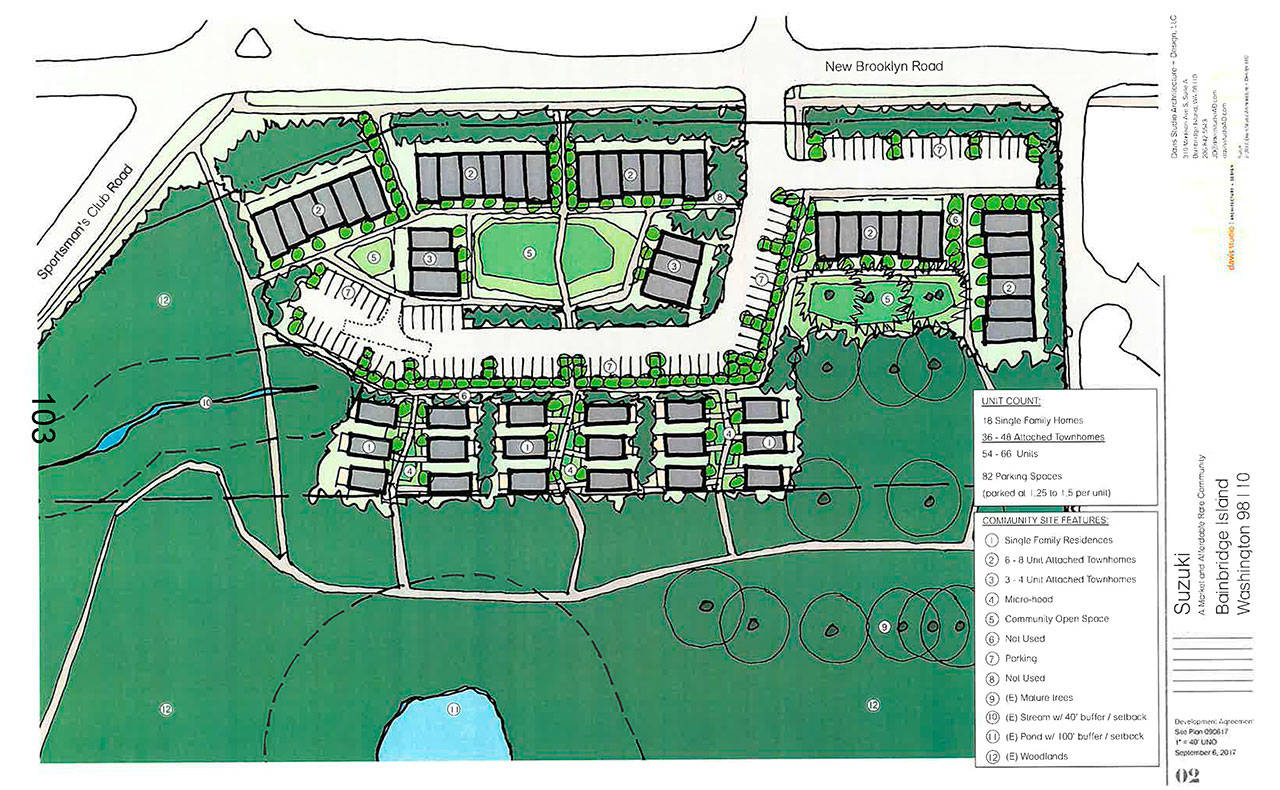The company that hopes to build a new neighborhood on the city-owned Suzuki property are now proposing to build up to 68 homes on the 13.83-acre parcel on New Brooklyn Road.
Officials with Olympic Property Group said the number of homes is lower than the 75 that would be allowed under the city’s Housing Design Development Program, and the plan would leave more land undeveloped than the company’s previous proposal.
Development of the Suzuki property has been highly controversial, largely due to increased traffic concerns from nearby neighborhoods, plus the potential environmental impacts to an existing large pond and old growth tree stand on the property.
The city council got an overview of the new plan at its meeting Tuesday.
Beyond the change in the layout of the development, which would see the housing clumped on the north end of the property, there are other major changes in the new plan, as well.
Setting aside space for a Boys & Girls Club facility has been cut from the Olympic proposal.
Previously, developers of the property has proposed dedicating space to a new home for the Bainbridge branch of the club, which currently uses leased space in the Coppertop business park.
“Significant garden areas” have also been cut from the plan, according to Olympic Property Group.
Olympic is now proposing to build 50 to 66 “affordable” homes on 4.2 acres of the Suzuki land; previously, 7.83 acres had been eyed for development. The units would include government-subsidized homes and non-subsidized units, and officials said the mix of homes would keep sales prices for the private units low.
Most of the townhomes will front a common courtyard, and Olympic officials noted the new development proposal is 40 percent smaller than the company’s previous plan for the land.
Another 15 to 20 single-family homes would be built and sold to private housing developers.
The development would also create a 15- to 25-foot buffer along New Brooklyn Road.
A total of 36 to 48 attached townhomes would be strung along the north end of the property near New Brooklyn Road, while the single-family homes would sit near the middle of the development, next to the large swath of open space that would be preserved that includes the land’s oldest trees, and the pond.
Olympic officials said the development plan would not result in the loss of any of the oldest trees on the property, and the existing pond would also stay untouched.
A total of 9.7 acres of the Suzuki property, or 70 percent, would remain undeveloped.
Olympic’s role would be limited to developing the land until it is ready to be sold to other developers, who would build the homes on the property and offer them for sale.
The land where the townhomes would be built would be sold to a joint project between Housing Kitsap and Housing Resources Bainbridge, which would then obtain government grants and loans to complete the subsidized housing project.
If those groups are unsuccessful by the time Olympic receives preliminary approval for its plans from the city, however, the company would sell the land to private home developers.
How would Olympic make money developing city-owned land? Olympic said it hopes to split the land sale revenues created by the housing project with the city, but after Olympic recoups its pre-design costs, its on- and off-site development costs, plus sales costs and the company’s staffing and overhead costs.
The company’s compensation request, it said, recognizes “the increased risk of taking on a controversial public project” but would create a partnership that would minimize costs to both the city and Olympic.
“This project has and will continue to be highly controversial. There is an above average chance that the project will get appealed,” Olympic president Jon Rose said in a Sept. 12 letter announcing the new plan to the city.
“In addition, its ownership by a public entity could result [in] the addition of complexity and cost,” he said.
Rose also warned that the project would take two to three years to complete and was coming “very late in the economic cycle.”
“While Seattle has one of the healthiest real estate markets in the country, it is not immune to market corrections which some predict could take place as early as 2019,” Rose said.
Olympic officials hope to get the city’s OK on its plan by the end of the year, with a preliminary plat submitted to the city by May, with the closing of the sale of the first home lot by May 2018.
“It’s just a proposal. This is not our property; it’s the city’s property,” Rose told the council Tuesday.
“We tried to find some balance,” Rose added, on issues that included preservation of open space, affordable housing, financial benefit to the city and a quality neighborhood.
The site plan was a target and a goal, he said.



